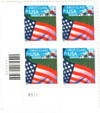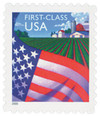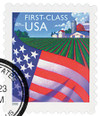
# 3449 - 2000 34c Flag Over Farm, non-denominated, self-adhesive (Ashton Potter)
34¢ Flag Over Farm
Die Cut 11.25
City: Washington, DC
Printed by: Ashton-Potter (USA) Ltd
Printing Method: Lithographed
Perforations: Serpentine Die Cut 11.25
Color: Multicolored
Birth of Robert Frost
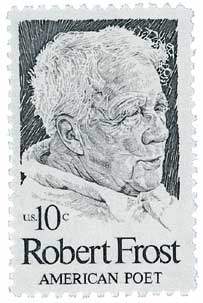
Robert Frost was born on March 26, 1874, in San Francisco, California. He’s the only poet to have won four Pulitzer Prizes for Poetry and has been called one of America’s “public literary figures, almost an artistic institution.”
Frost grew up in San Francisco until 1885, when his father, journalist William Prescott Frost Jr. died. His family then moved across the country to Lawrence, Massachusetts. The younger Frost published his first poem in his high school’s magazine before graduating in 1892.
That year Frost attended Dartmouth College, but returned home after only two months. There he taught, helped his mother manage a class of unruly boys, delivered newspapers, and worked in an arc lamp factory.

Though Frost worked a variety of jobs, he knew poetry was his true calling. Then, in 1894, he sold his first poem, “My Butterfly. An Elegy,” which appeared in the New York Independent. After marrying Elinor Miriam White, Frost went to Harvard for two years beginning in 1897. But he left the school early due to illness and began working on a farm his grandfather gave him in Derry, New Hampshire. Over the course of nine years, Frost woke early every morning to write poems (that would later make him famous) before spending his day in the field. When the farm proved unsuccessful, Frost returned to education, teaching English at two New Hampshire Schools between 1906 and 1911.

The next year Frost took his family to Great Britain, establishing a home in Beaconsfield, just outside of London. While there, he made a number of influential friends and published his first two poetry volumes – A Boy’s Will and North of Boston.
After the start of World War I, Frost returned to America and bought a farm in Franconia, New Hampshire. His poems were inspired by the region’s beauty, landscapes, folkways, and speech patterns. His graceful, plain-language poems are most often set in New England, particularly Vermont and New Hampshire.
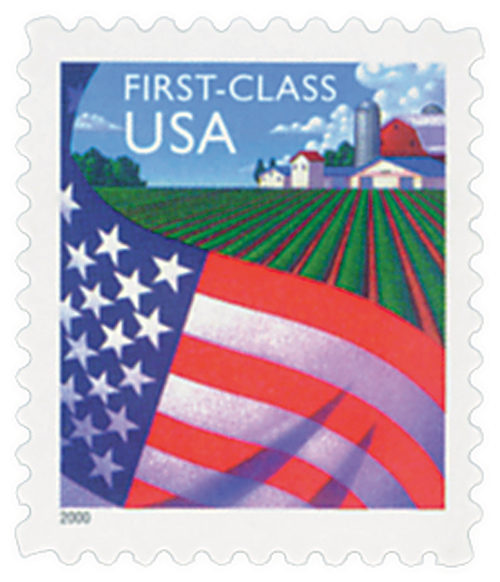
On and off over the next 20 years, he taught English at Amherst College in Massachusetts. Frost won his first Pulitzer Prize in 1924 for his book New Hampshire: A Poem with Notes and Grace Notes. He received subsequent Pulitzers for Collected Poems in 1931, A Further Range in 1937, and A Witness Tree in 1943.
Between 1921 and 1963, Frost spent nearly every summer teaching at the Bread Loaf School of English at Middlebury College in Ripton, Vermont, and is credited with helping to develop the school’s writing programs. Also in the 1920s he spent seven years teaching at the University of Michigan.
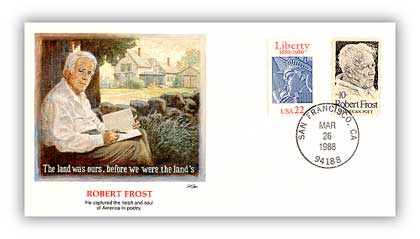
Frost received a number of honors during his lifetime, including over 40 honorary degrees, though he never graduated from college. He has the distinction of being the only person to receive two honorary degrees from Dartmouth. Frost is also the poet laureate of Vermont. In 1960, he was awarded the Congressional Gold Medal “in recognition of his poetry, which has enriched the culture of the United States and the philosophy of the world.”

The following year, at age 86, Frost was asked to read one of his poems for President Kennedy’s inauguration. He composed a new piece entitled “Dedication,” but was unable to read it because of the sun’s glare on his paper. Instead he recited “The Gift Outright,” a patriotic poem he had written decades before. He died two years later on January 29, 1963.
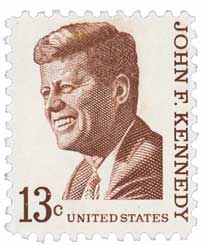
After Frost died in 1963, the state of New Hampshire acquired his Derry farm and restored it. It opened in 1975 as the Robert Frost Farm State Historic Site, a historic house museum. The farm was designated a National Historic Landmark and a New Hampshire State Park.
34¢ Flag Over Farm
Die Cut 11.25
City: Washington, DC
Printed by: Ashton-Potter (USA) Ltd
Printing Method: Lithographed
Perforations: Serpentine Die Cut 11.25
Color: Multicolored
Birth of Robert Frost

Robert Frost was born on March 26, 1874, in San Francisco, California. He’s the only poet to have won four Pulitzer Prizes for Poetry and has been called one of America’s “public literary figures, almost an artistic institution.”
Frost grew up in San Francisco until 1885, when his father, journalist William Prescott Frost Jr. died. His family then moved across the country to Lawrence, Massachusetts. The younger Frost published his first poem in his high school’s magazine before graduating in 1892.
That year Frost attended Dartmouth College, but returned home after only two months. There he taught, helped his mother manage a class of unruly boys, delivered newspapers, and worked in an arc lamp factory.

Though Frost worked a variety of jobs, he knew poetry was his true calling. Then, in 1894, he sold his first poem, “My Butterfly. An Elegy,” which appeared in the New York Independent. After marrying Elinor Miriam White, Frost went to Harvard for two years beginning in 1897. But he left the school early due to illness and began working on a farm his grandfather gave him in Derry, New Hampshire. Over the course of nine years, Frost woke early every morning to write poems (that would later make him famous) before spending his day in the field. When the farm proved unsuccessful, Frost returned to education, teaching English at two New Hampshire Schools between 1906 and 1911.

The next year Frost took his family to Great Britain, establishing a home in Beaconsfield, just outside of London. While there, he made a number of influential friends and published his first two poetry volumes – A Boy’s Will and North of Boston.
After the start of World War I, Frost returned to America and bought a farm in Franconia, New Hampshire. His poems were inspired by the region’s beauty, landscapes, folkways, and speech patterns. His graceful, plain-language poems are most often set in New England, particularly Vermont and New Hampshire.

On and off over the next 20 years, he taught English at Amherst College in Massachusetts. Frost won his first Pulitzer Prize in 1924 for his book New Hampshire: A Poem with Notes and Grace Notes. He received subsequent Pulitzers for Collected Poems in 1931, A Further Range in 1937, and A Witness Tree in 1943.
Between 1921 and 1963, Frost spent nearly every summer teaching at the Bread Loaf School of English at Middlebury College in Ripton, Vermont, and is credited with helping to develop the school’s writing programs. Also in the 1920s he spent seven years teaching at the University of Michigan.

Frost received a number of honors during his lifetime, including over 40 honorary degrees, though he never graduated from college. He has the distinction of being the only person to receive two honorary degrees from Dartmouth. Frost is also the poet laureate of Vermont. In 1960, he was awarded the Congressional Gold Medal “in recognition of his poetry, which has enriched the culture of the United States and the philosophy of the world.”

The following year, at age 86, Frost was asked to read one of his poems for President Kennedy’s inauguration. He composed a new piece entitled “Dedication,” but was unable to read it because of the sun’s glare on his paper. Instead he recited “The Gift Outright,” a patriotic poem he had written decades before. He died two years later on January 29, 1963.

After Frost died in 1963, the state of New Hampshire acquired his Derry farm and restored it. It opened in 1975 as the Robert Frost Farm State Historic Site, a historic house museum. The farm was designated a National Historic Landmark and a New Hampshire State Park.






